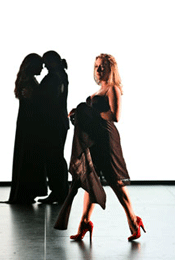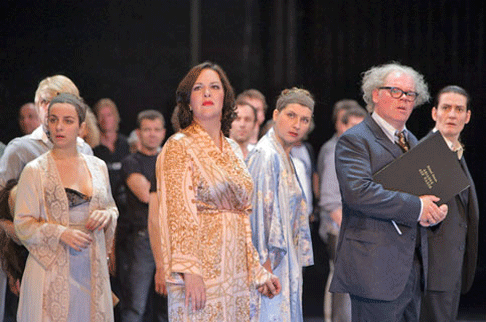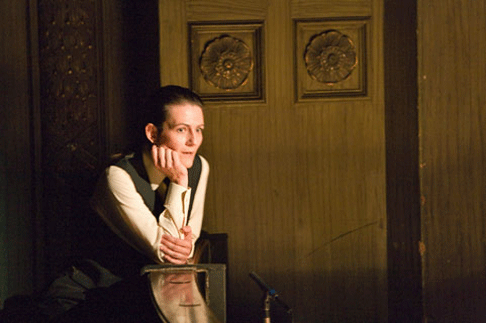21 Jul 2009
A knock-out Ariadne auf Naxos at Munich’s Bavarian State Opera Festival
There are rare times when a critic can just enjoy, and say “Wow!”

There are rare times when a critic can just enjoy, and say “Wow!”
The lucky audience at the Bavarian State Opera Festival’s Ariadne auf Naxos was witness to one of the most remarkably fluid and fun performances of this Richard Strauss work it has been my pleasure to see. The quirky production, every member of the cast — even deeply into the smallest roles — the conductor and the orchestra, all were of a single mind, and all at the top of their game. The result was total, unalloyed delight. It doesn’t get better than this.
From the very beginning, with dozens of mirrors wheeled on to the empty black stage, their reflections and changing placement instantly fracturing the stage focus into kaleidoscopically reconfigured crystalline structures — not unlike in the celebrated climax of Orson Welles’ classic film “Lady from Shanghai,” a chase set in a fun-house of mirrors — this genius production by Robert Carsen beautifully embodied the Hoffmanstahl/Strauss conceit of irrationally mixing up two disparate genres. If perhaps there was one too many upright pianos wheeled onstage here, or an occasional longeur there, these were minor cavils when the whole is such a beautifully realized directorial high-wire act. If theater is just smoke and mirrors, Carsen managed it brilliantly with barely more than the latter.
 Scene from Ariadne auf Naxos with Diana Damrau as Zerbinetta in the foreground
Scene from Ariadne auf Naxos with Diana Damrau as Zerbinetta in the foreground
The audience’s darling, as it should be, was the Zerbinetta of Diana
Damrau, who proved capable of an astonishing range of physical acting, vocal
pyrotechnics, and plain delight throughout the performance. Her red high heels
came on and off with aplomb as she negotiated the virtuoso demands of the part
and the production. She presents herself with a freshness and seemingly
off-the-cuff decisions that are nothing short of daringly breathtaking. Even
the most strenuous episodes came off with an irrepressible naturalness which is
the opposite of studied. One hardly knows what to praise more, her musicianship
or her acting — but the two cannot be separated. They form a seamless
wonder, with or without those red high-heels.
But Damrau was hardly alone in this deep cast of talented artists. Each contributed his or her more than considerable best. Primadonna/Ariadne, Adrianne Pieczonka and Composer Daniela Sindram were also as magnificent in their fiery roles, and gave no grounds for anything other than complete admiration. Everyone in the cast made the most of their moments to shine. Martin Gantner (Musiklehrer) was suitably aggrieved. Burkhard Fritz was an outstanding Tenor/Bacchus. Nikolay Brochev (Harlequin), Ulrich Ress (Scaramuccio), Steven Humes (Truffaldin), Kevin Conners (Brighella), Christian Rieger (Lakai), Guy de Mey (Tanzmeister), Kenneth Robertson (Offizier), Aga Mikolaj (Najade), Nicole Piccolomini (Dryade), Sine Bundgaard (Echo) were all excellent. Todd Boyce, who two nights before had been one of the clown-chorus of Bernstein’s Trouble in Tahiti, here was an amusing Wigmaker. Non-singing actor Johannes Klama was a most officious Haushofmeister. Bravi tutti.
 Scene from Ariadne auf Naxos with Adrianne Pieczonka as the Primadonna in foreground
Scene from Ariadne auf Naxos with Adrianne Pieczonka as the Primadonna in foreground
Under the baton of Bertrand de Billy, he Bavarian State Opera Orchestra did itself more than proud, effortlessly supporting the singers and the stage action. All played exquisitely, with verve and delightful, drawing exquisite colors out of this perversely refined yet tatterdemalion score, wheezing harmonium included.
My one and only complaint is the lack of intermission between Vorspiel and “opera” proper, especially since the wooden seats of the Bayreuth-like Prinzregenten Theater begin to test the physical limits of the audience for such a long period, reminding one why German, apparently alone among languages, has that particular word Sitzfleisch, or sitting endurance. But more importantly, a toast would have been welcome for such a bravura display of artistry before plunging into the “performance” proper, It also forced the Composer in this production to spend the second half of the work standing mute at the foot of the stage among the audience, looking on. A missed opportunity for the audience to collectively celebrate their great good luck to be able to witness such a marvelous, dizzyingly witty and rich realization of this complex work.
 Daniela Sindram as Der Komponist
Daniela Sindram as Der Komponist
The performance took place in the Bayreuth-like art-deco Prinzregenten Theater, the middle-sized of the Bavarian State Opera’s three opera houses, located by Munich’s Isar river.
Raphael Mostel © 2009